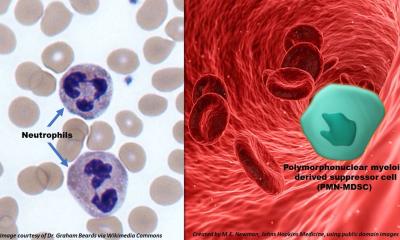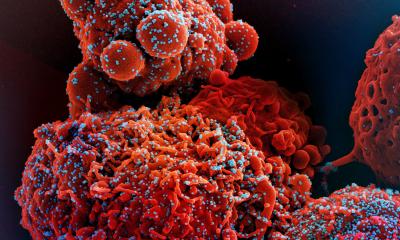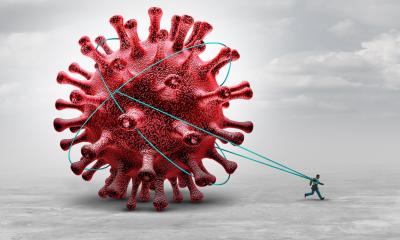News • Light or severe progression
The dangerous dual role of the immune system in COVID-19
Infection with the novel coronavirus SARS-CoV-2 follows a highly variable course: some of those infected do not even notice it, while others become so seriously ill that their lives are placed at risk.
Scientists from the Berlin Institute of Health (BIH) and Charité – Universitätsmedizin Berlin and their colleagues from Leipzig and Heidelberg have now discovered that the immune system has a decisive influence on the progression of the disease. Using single-cell analysis, they discovered that epithelial cells affected by the virus issue a “distress call” to the immune system. However, migrating immune cells occasionally overshoot the mark and, due to their excessive reaction, sometimes cause greater damage than the virus itself. The researchers have now published their findings in the journal Nature Biotechnology.
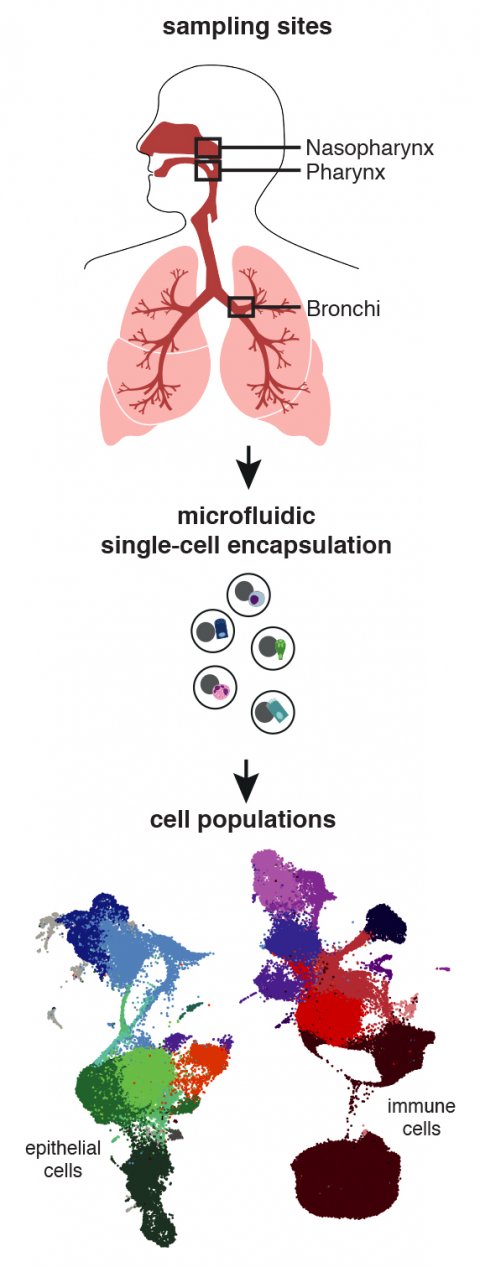
Even before the first COVID-19 patients were treated at Charité, Professor Roland Eils, chair and founding director of the BIH Digital Health Center, initiated a study together with Professor Irina Lehmann, head of the Molecular Epidemiology Research Group at the BIH, to investigate the molecular and cellular causes of COVID-19. “We suspected that the body’s own immune system plays a role in the different disease progressions. And we wanted to understand this in more detail,” Lehmann says. Eils and his team under Dr. Christian Conrad used what is known as single-cell analysis to examine every cell obtained from the respiratory tracts of COVID-19 patients. This is because each cell reacts differently to the infection and provides individual information on the course of the disease, which can be read from the individual responses of thousands of genes in each cell.
Patients in this study were recruited at Charité – Universitätsmedizin Berlin within the framework of the PA-COVID-19 study. Professor Leif-Erik Sander, who treats COVID-19 patients in the Department of Infectious Diseases and Pulmonary Medicine and who heads the PA-COVID-19 study at Charité, took on a central role in the single-cell study in Berlin. The Leipzig University Medical Center also participated in the study. In Leipzig, the study was led by Dr. Sven Laudi, a senior physician for intensive care medicine in the Department of Anesthesiology and Intensive Care. In total, samples from nineteen COVID-19 patients as well as from five healthy control subjects were examined. Eight of these COVID-19 patients showed a rather moderate disease progression, while eleven showed a critical progression. “The samples came from the nasopharynx, as well as from the bronchial tubes of two patients. We were able to obtain longitudinal samples from five patients at several time points, which enabled us to follow the progression of the disease in the same patient,” Sander explains.
Recommended article
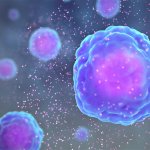
News • Deadly mechanism uncovered
Inside COVID-19's 'cytokine storm'
Leading immunologists in Japan are proposing a possible molecular mechanism that causes massive release of proinflammatory cytokines, or a cytokine storm, leading to the acute respiratory distress syndrome (ARDS) in COVID-19 patients. Their suggestions, published in the journal Immunity, are based on recent findings that explain how SARS-CoV-2 enters human cells.
“We isolated cells from the patient samples in the SL3 laboratory of Charité’s Institute of Virology under the most stringent safety conditions and sequenced a total of 160,528 cells,” says Robert Lorenz Chua and Dr. Soeren Lukassen, both from the BIH Digital Health Center, in describing the mammoth task that had to be accomplished. “In addition to immune cells, we mainly found cells from the uppermost layer of the respiratory tract in the samples, i.e., various epithelial cells. From these we isolated RNA containing the viral genome, but also the transcripts of active genes in the human cells. Based on this data and clinical information, we were able to precisely follow the course of the infection at the single-cell level.”
These results suggest that our treatments in COVID-19 patients should not only be directed against the virus itself, but should also consider therapies that constrain the immune system
Leif-Erik Sander
SARS-CoV-2 enters the cells by attaching itself to the ACE2 receptors. “We saw that the ACE2 receptor is twice to three times more strongly expressed in some epithelial cells of COVID-19 patients than in the epithelial cells of non-infected control subjects,” Conrad explains. The infected cells send a “distress call” to the immune system and attract immune cells that help fight the infection by specifically killing the infected epithelial cells and neutralizing the virus. “It is interesting to note that in the case of COVID-19, the signaling protein interferon, which is actually the immune system’s central defense strategy against viral infections, contributes to the epithelial cells producing more ACE2 and hence becoming more vulnerable to viral infection,” Lehmann explains. The immunologist adds: “In COVID-19, the immune system thus helps the virus to infect further cells, thereby amplifying the disease.” In addition, the scientists observed that especially in severely ill patients, the immune cells react with excessive inflammation.
“The single-cell analysis has shown very clearly that the virus forms an ominous alliance with the patient’s immune system,” Eils explains. “Especially in severely ill patients, we observed that an overreactive immune system drives the destruction of the lung tissue. This might explain why these patients are more severely affected by the infection than patients in whom the immune system reacts appropriately.” And Sander adds: “These results suggest that our treatments in COVID-19 patients should not only be directed against the virus itself, but should also consider therapies that constrain the immune system, such as those now being used with dexamethasone, possibly even at the onset of the disease to prevent the immune system from overreacting.”
Source: Berlin Institute of Health (BIH)
26.06.2020



